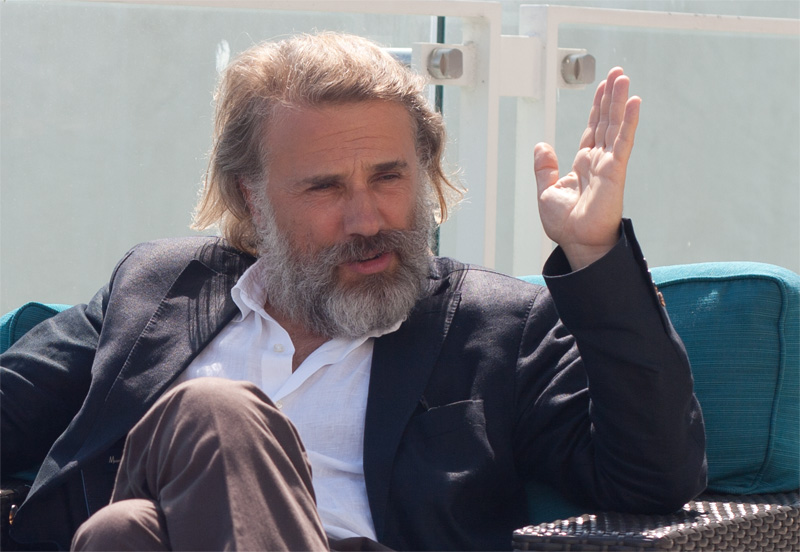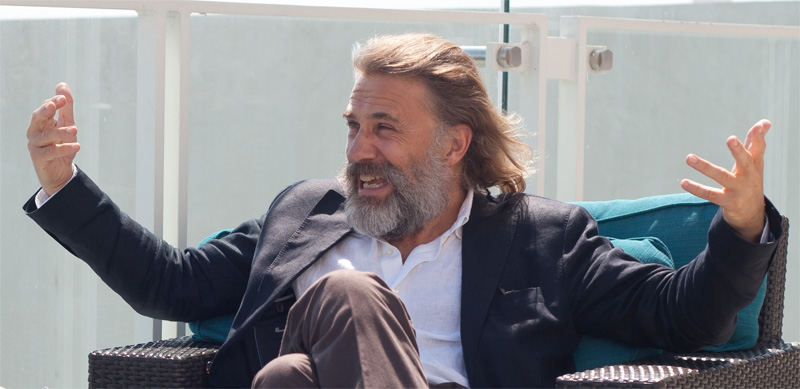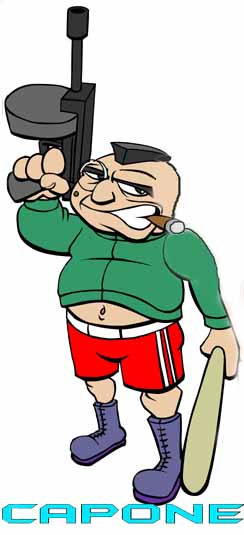Hey everyone. Capone in Chicago here.
Okay, I'll be the first to admit this is one of the more…obtuse interviews I've ever conducted. I figured it would be simple. Come in, talk a few minutes about Quentin Tarantino's DJANGO UNCHAINED with one of its primaries, Christoph Waltz, who won a Supporting Actor Oscar for playing Jew killer Col. Hans Landa in Tarantino's INGLOURIOUS BASTERDS. Since then he's appeared in such films as THE GREEN HORNET with Seth Rogen, WATER FOR ELEPHANTS, with Reese Witherspoon, the most recent telling of THE THREE MUSKETEERS, and most recently as Kate Winslet's lawyer husband in CARNAGE.
The first trailer for DJANGO UNCHAINED pretty much spells out the beginning of the relationship that Waltz's character, former dentist-turned bounty hunter Dr. King Schultz, has with Jamie Foxx's slave Django. Schultz needs Django to help him identify some very bad men; Foxx needs Schultz to help him rescue his wife from a plantation owner. But here's the thing: I didn't get any of that information or any information about his character in the movie from Waltz.
Apparently he's in a self-imposed information lockdown mode, and he was happy to explain why. I happen to agree with 95 percent of his reasons, and this idea that audiences are walking into films these days with more and more information about said movies is a little discouraging. People see so many trailers and footage in advance, they've already begun to formulate opinions about the quality of the film just based on fragments, and I don't mind saying that's a terrible precedent.
Weirdly enough at this year's Comic-Con--and institution built on giving fans first looks at upcoming genre work--this topic of Too Much has come up a few times in interviews, and the consensus seems to be that going into a movie with almost no knowledge of plot, character arcs, even cast is a lot of fun. I grew up in a time where one trailer and maybe a couple of TV commercials (usually just reductions of the theatrical trailer) were all we got before walking into a darkened theater to watch a film. I get that people want to have informed decisions before they drop a whole lot of cash on taking the family or a date to a movie, but going in blind can be a blast, and I tend to cherish any opportunity I can to know as little as possible about a particular film before I see it (not always possible with bigger films, but I try).
When I hear someone say they don't want to see a film because they didn't like the look of the trailer, I often want to throttle them. Trailers are notoriously misleading: making bad movies look good, and good movies look like shit. It happens with every week's new crop of trailers, and while I get as much of a kick out of a well-cut trailer as the next guy, I don't trust the people that cut them. The number of people who tell me that MAGIC MIKE, for example, "wasn't what they thought it would be," are really saying "The trailer looked like X, but the movie was Y." Stop trusting trailers to rule your decision; trust your gut, folks; it's probably more reliable. (Dismount soapbox.)
Moving back to my Christoph Waltz interview. Read what he says about the purity of the moviegoing experience. It's actually quite beautiful. And yes, we do talk a bit about his experience with Tarantino this time around. It's a short interview; you'll like it. Enjoy Mr. Waltz, and forgive him his omissions. Photos come courtesy of Gavin "Malone" Stokes.

Capone: How did the panel go?
Christoph Waltz: It’s always fascinating.
Capone: You’ve been here before, right? You were here for GREEN HORNET.
CW: Yeah, what I liked better about that panel was that there were more audience questions. There was a whole long line of crazily dressed-up people asking, some of them, really clever questions.
Capone: Not today so much?
CW: No, there were only three.
Capone: Really?
CW: Yeah, because there was no time.
Capone: Oh, they ran out of time. But in terms of the reaction to the footage…
CW: It’s wild. Not that I’m so distanced, but this is a huge crowd of people who are eager and interested and completely with it, and they come here to participate. That’s an ideal audience, and you don’t really see that too often.
Capone: That’s true, even at your own premieres you don't.
CW: No, because especially with premieres, everybody has an opinion, and here they're with it just to be here.
Capone: I realize, more so with this film than GREEN HORNET, you have to hold back a little more about the information you’re giving out.
CW: Yeah, you know this isn’t even finished shooting.
Capone: That’s the most bizarre thing and that’s not the first time that’s happened here, but…
CW: No, but in this case, Quentin will then sit for months and edit, and you might be talking about a movie that will not exist in the end. Also there are so many surprises waiting for the audience; you don’t want to spoil it.
Capone: Sure.
CW: I have a problem anyway with talking about movies, you know? I can recommend a restaurant, but if I tell you exactly “The schnitzel there is the best,” I can’t. It's too specific.
Capone: What can you say about the character that you play a little bit?
CW: I don’t.
Capone: No?
CW: No, if you want to, I can tell you why I don’t, but it’s along those lines. I think being there and being with it, what’s happening on the screen is one of the not only basic reasons why we go to he movies at all, it’s one of the basic human experiences, and that’s why I dislike that term “entertainment industry.” Some of it is just entertainment, but the best stories really are about ourselves. Do you know what I mean?
When we watch a movie, we identify to a degree; we suffer with the hero. We have to make these moral choices that the characters are going through. We like to take sides. We are rooting for this guy or for that woman. We share the romantic interest. It’s all about testing and gauging our faculties really, and that’s what makes the experience in the movie so strong. If you are completely briefed, informed, biased, preoccupied…

Capone: With information…
CW: With information, exactly. You can’t really experience it anymore, and I just decided at one point that it is extremely counterproductive to what I’m trying to do to give you my point of view, because I’m not supposed to have a point of view. I’m just supposed to play the part. And really in my book, that’s a way of telling a good performance from a bad one. If I get the actor’s opinion, I don’t want their opinion. I might be interested in his opinion, but not at that moment when I watch the story unfold. I don’t want to be influenced by anything. I hate to read reviews before I see the film.
Capone: I certainly grew up in a time where, when I was younger in the '80s, all you had was a trailer going into a movie, and I loved that and I still look forward to times where I can go into a movie knowing absolutely nothing about it.
CW: Right. When a movie comes out that I’m interesting in, I stop informing myself, because I want to see it. I don’t want to sit and have to find, say, INCEPTION a certain way. I want to have the right to say “No, I’m sorry,” because it’s about me, not because I pay the price, but that’s what storytelling is; it’s not about the teller, it’s about the listener.
Capone: You’ve worked with Quentin before. Was there any difference for you in stepping in this time?
CW: Yes and no. Certain things were comfortable, yeah. Certain things were more comfortable, because I could understand him right away. When you get to know someone, you don’t quite know how the other person actually means, and you hear the words and you see the person try to communicate, but then you try to communicate back until you find a common ground. Now that common ground was found. We had that, yet I made maybe too big of an effort to not fall into the trap of repeating, because it’s a completely different story, completely different set up, completely different constellation of people, different background, different culture, different everything.
I didn’t want to just say, “Well, that’s a done deal.” No, the actual finding out the details and working out the very special requirements and really adhering to that specific story and that specific character was what I found important, and maybe I went a little far with stepping back from all prior experiences with: “No, no we have to start from scratch.” But it was a good thing.
Capone: Yeah, I see that you ride a horse in this. Were you much of a horse rider before this film?
CW: Kind of, I mean horses are strange creatures. [laughs]
Capone: Well thank you very much. It was really wonderful to meet you.
CW: Sorry if I seemed evasive.
Capone: You were protecting the integrity of the filmgoing experience. I can't help but respect that.
CW: Good. Nice meeting you.
-- Steve Prokopy
"Capone"
capone@aintitcool.com
Follow Me On Twitter

CW: Kind of, I mean horses are strange creatures. [laughs]
Capone: Well thank you very much. It was really wonderful to meet you.
CW: Sorry if I seemed evasive.
Capone: You were protecting the integrity of the filmgoing experience. I can't help but respect that.
CW: Good. Nice meeting you.
-- Steve Prokopy
"Capone"
capone@aintitcool.com
Follow Me On Twitter

